G M A 3 4 0
A U D I O P A N E L
P i l o t ’ s
G u i d e
®
�
Front Panel Controls
MKR
BCN
1. Marker Beacon Lamps
2. Marker Beacon Receiver Audio Select/Mute Button
3. Marker Beacon Receiver Sensitivity Indicator LED.
4. Marker Beacon Receiver Sensitivity Selection Button
ICS
5. Unit On/Off, Pilot Intercom System (ICS) Volume
6.
7. Copilot and Passenger ICS Volume Control (Pull out for Passenger
Pilot ICS Voice Activated (VOX) Intercom Squelch Level
Volume)
8. Copilot/Passenger VOX Intercom Squelch Level
9. Crew Isolation Intercom Mode Button
10. Pilot Isolation Intercom Mode Button
11. Passenger Address (PA) Function Button
12. Speaker Function Button
COM/
NAV
13. Transceiver Audio Selector Buttons (COM1, COM2, COM3)
14. Transmitter (Audio/Mic) Selection Buttons
15. Split COM Button
16. Aircraft Radio Audio Selection Buttons (NAV1, NAV2, DME, ADF)
17. Annunciator Test Button
18. Locking Screw Access
19. Photocell - Automatic Annunciator Dimming
1
�
On, Off, and Fail-Safe Operation
The GMA 340 is powered off when the left small knob (5) is rotated fully CCW into the detent.
To turn the unit on, rotate the knob clockwise past the click. The knob then functions as the pilot
ICS volume control. A fail-safe circuit connects the pilot’s headset and microphone directly to
COM1 in case power is interrupted or the unit is turned off.
Lighting
LED button annunciator and marker beacon lamp intensity are controlled automatically by a
built-in photocell on the front panel. Nomenclature backlighting is controlled by the aircraft dim-
mer buss.
Transceivers
NOTE
Audio level is controlled by the selected COM radio volume controls.
Selection of either COM1, COM2, or COM3 for both MIC and audio source is accomplished by
pressing either COM1 MIC, COM2 MIC, or COM3 MIC (14). The active COM audio is always
heard on the headphones.
Additionally, each audio source can be selected independently by pressing COM1, COM2, or
COM3 (13). When selected this way, they remain active as audio sources regardless of which trans-
ceiver has been selected for microphone use.
When a microphone is keyed, the active transceiver’s MIC button LED blinks approximately
once per second to indicate that the radio is transmitting.
Split COM
Pressing the COM 1/2 button (15) activates the split COM function. When this mode is active,
COM1 is dedicated solely to the pilot for MIC/audio while COM2 is dedicated to the copilot for
MIC/audio. The pilot and copilot can simultaneously transmit in this mode over separate radios.
Both pilots can still listen to COM3, NAV1, NAV2, DME, ADF, and MKR as selected. The split COM
mode is cancelled by pressing the COM 1/2 button a second time.
When in the split COM mode the copilot may make PA announcements while the pilot contin-
ues using COM1 independently. When the PA button is pressed after the split com mode is acti-
vated, the copilot’s mic is output over the cabin speaker when keyed. A second press of the PA but-
ton returns the copilot to normal split COM operation.
2
�
NOTE
If the COM radios utilize a “transmit interlock” system, the split COM function
may require that this feature is enabled. Refer to the radio installation manual
for guidance. GARMIN makes no expressed or implied guarantees regarding
the suitability of the split COM feature in a given installation.
COM Swap Function
The GMA 340 allows the use of a remote mounted switch (typically on the yoke) to alternately
transfer the active microphone back and forth between COM1 and COM2. Pressing the remote
switch will have no effect if COM3 is the active transceiver. Ask your installing agency for details.
Aircraft Radios & Navigation
NOTE
Audio level is controlled by the selected NAV radio volume control.
Pressing NAV1, NAV2, DME, ADF (16), or MKR (2) (see MKR Beacon Receiver) selects each
audio source. A second button press deselects the audio. In addition, the GMA 340 provides inputs
for an unswitched aircraft radio (TEL RINGER) and an un-muted, unswitched aircraft radio (ALT
WRN).
Speaker Output
Pressing the SPKR button (12) selects the aircraft radios over the cabin speaker. The speak-
er output is muted when a COM microphone is keyed. The GMA 340 speaker output level can
be adjusted by your installing agency.
PA Function
The PA mode is activated by pressing the PA button (11). Then, when either the pilot’s or
copilot’s microphone is keyed, the corresponding mic audio is heard over the cabin speaker. If the
SPKR button is also active, then any selected speaker audio is muted while the microphone is keyed.
The SPKR button does not have to be previously active in order to use the PA function. Pilot and
copilot PA microphone speaker levels are adjustable by your installing agency.
3
�
Auxiliary Entertainment Inputs
The GMA 340 provides two stereo entertainment inputs: MUSIC1 and MUSIC2. MUSIC1 is
soft-muted during all aircraft radio activity and normally during ICS activity. MUSIC2 is a non-
muted input. These inputs are compatible with popular portable entertainment devices such as cas-
sette tape or CD players. The headphone outputs of these devices are used and plugged into
MUSIC1 or MUSIC2. Two 3.5 mm stereo phone jacks should be installed in a convenient location
for this purpose. MUSIC1 and MUSIC2 have characteristics that are affected by the active intercom
mode. Refer to the table on page 5.
Intercom System (ICS)
Intercom volume and squelch (VOX) are adjusted using the following front panel knobs:
• LEFT SMALL KNOB—Unit ON/OFF power control and Pilot ICS volume. Full CCW detent
position is OFF.
• LEFT LARGE KNOB—Pilot ICS mic VOX squelch level. CW rotation increases the amount
of mic audio (VOX level) required to break squelch. Full CCW is the “HOT MIC” position
(no squelch).
• RIGHT SMALL KNOB—IN position: Copilot ICS volume. OUT position: Passenger ICS
volume.
• RIGHT LARGE KNOB—Copilot and passenger mic VOX squelch level. CW rotation
increases the amount of mic audio (VOX level) required to break squelch. Full CCW is the
“HOT MIC” position.
Each of the six microphone inputs have dedicated VOX circuits to ensure that only the active
microphone(s) is/are heard when squelch is broken. This represents a vast improvement over the
party-line systems and reduces the amount of background noise in the headphones during cockpit
communications. After the operator has stopped talking, the intercom channel remains momentar-
ily open to avoid closure between words or normal pauses.
The GMA 340 provides three intercom modes: PILOT, CREW and ALL. Mode selection is
accomplished using the PILOT and/or CREW buttons. Pressing a mode button activates the corre-
sponding ICS mode. Pressing again deactivates the mode. The ALL mode is active when neither
PILOT nor CREW LEDs are lit. To switch from PILOT to CREW mode, press the CREW button;
from CREW to PILOT, press the PILOT button. An LED ON indicates the isolation mode is active.
4
�
• PILOT mode isolates the pilot from everyone else and dedicates the aircraft radios
to the pilot exclusively. The copilot and passengers share communication between
themselves but cannot communicate with the pilot or hear the aircraft radios.
• CREW mode places the pilot and copilot on a common ICS communication chan-
nel with the aircraft radios. The passengers are on their own intercom channel and
can communicate with each other, but cannot communicate with the crew or hear
the aircraft radios.
• ALL mode allows full intercom communication between everyone plugged in to
the GMA 340. Aircraft radios are also heard by all.
• MUSIC1 and MUSIC2 stereo entertainment inputs are affected by the intercom
mode selected.
The following table summarizes the ICS operation for the different modes supported by the
GMA 340.
MODE
PILOT HEARS
COPILOT HEARS
PASSENGER HEARS
PILOT
(LED
LIT)
Selected Radios.
Pilot.
Copilot.
Passengers.
MUSIC1.
CREW
(LED
LIT)
Selected Radios.
Pilot. Copilot.
MUSIC1.
Selected Radios.
Copilot. Pilot.
MUSIC1.
Passengers.
Copilot.
MUSIC1.
Passengers.
MUSIC2.
ALL
(LEDs
OFF)
Selected Radios.
Pilot.
Copilot.
Passengers.
MUSIC1.
Selected Radios.
Pilot.
Copilot.
Passengers.
MUSIC1.
Selected Radios.
Pilot.
Copilot.
Passengers.
MUSIC1.
MUSIC1 MUTING
TRIGGERED BY
Copilot or passenger
intercom activity.
Aircraft radio activity.
MKR activity.
Pilot or copilot activity.
Aircraft radio activity.
MKR activity.
Intercom activity.
MUSIC1 is normally muted during ICS activity. However an installation option is available to
disable ICS MUTE. Then muting of MUSIC1 will not occur due to ICS activity. A panel mounted
switch may be installed for this function. The MUSIC1 mute trip level is adjustable by the installa-
tion agency.
5
�
Marker Beacon Receiver
The marker beacon is used as part of an ILS approach and in certain instances, to
identify an airway. In addition to the normal marker beacon functions, the GMA 340
provides an audio muting function. The lamps illuminate, and an associated keyed-
tone is heard (when MKR audio is selected), when the aircraft passes over a 75 MHz
marker beacon transmitter.
The lamp and audio keying for ILS approach operation are summarized below.
Audio
Frequency
400
1300
3000
Audio Keying
Lamp Actuated
Blue (Outer)
Amber (Middle)
White (Airway/Inner)
The marker beacon audio level is aligned at the factory to produce its rated audio output.
However, the audio output level is adjustable by your installing agency.
The GMA 340’s marker beacon receiver controls are located on the left side of the front panel
(1-4). The SENS button selects either high or low sensitivity as indicated by the HI or LO LED being
lit. Low sensitivity is used on ILS approaches while high sensitivity allows operation over airway
markers or to get an earlier indication of nearing the outer marker during an approach.
The marker audio is initially selected by pressing the MKR/mute button (2). If no marker bea-
con signal is received, then a second button press will deselect the marker audio. This operation is
similar to selecting any other audio source on the GMA 340. However, if the second button press
occurs while a marker beacon signal is received, then the marker audio is muted but not deselect-
ed. The button’s LED will remain lit to indicate that the source is still selected. When the current
marker signal is no longer received, the audio is automatically un-muted. While in the muted state,
pressing the MKR/mute button deselects the marker audio. The button’s LED will extinguish to indi-
cate that the marker audio is no longer selected.
The marker beacon lamps operate independently of any audio selection and cannot be turned
off. The GMA 340 can drive external marker lamps if required.
6
�
®
© 1998 GARMIN Corporation
www.garmin.com
GARMIN International, Inc.
1200 E. 151st Street, Olathe, KS USA 66062-3426
Telephone (913) 397-8200 or 1-800-800-1020 FAX (913) 397-8282
Unit 5, The Quadrangle, Abbey Park Industrial Estate, Romsey, SO51 9AQ U.K.
Telephone 011-44-1794-519944 FAX 011-44-1794-519222
GARMIN (Europe) Ltd.
GARMIN (Asia) Corp.
3F, No.1, Lane 45, Pao Hsing Road, Hsin Tien, Taipei, Taiwan, ROC
Telephone 886-02-2917-3773 FAX 886-02-2917-1758
Part Number 190-00149-00 Rev. C
�

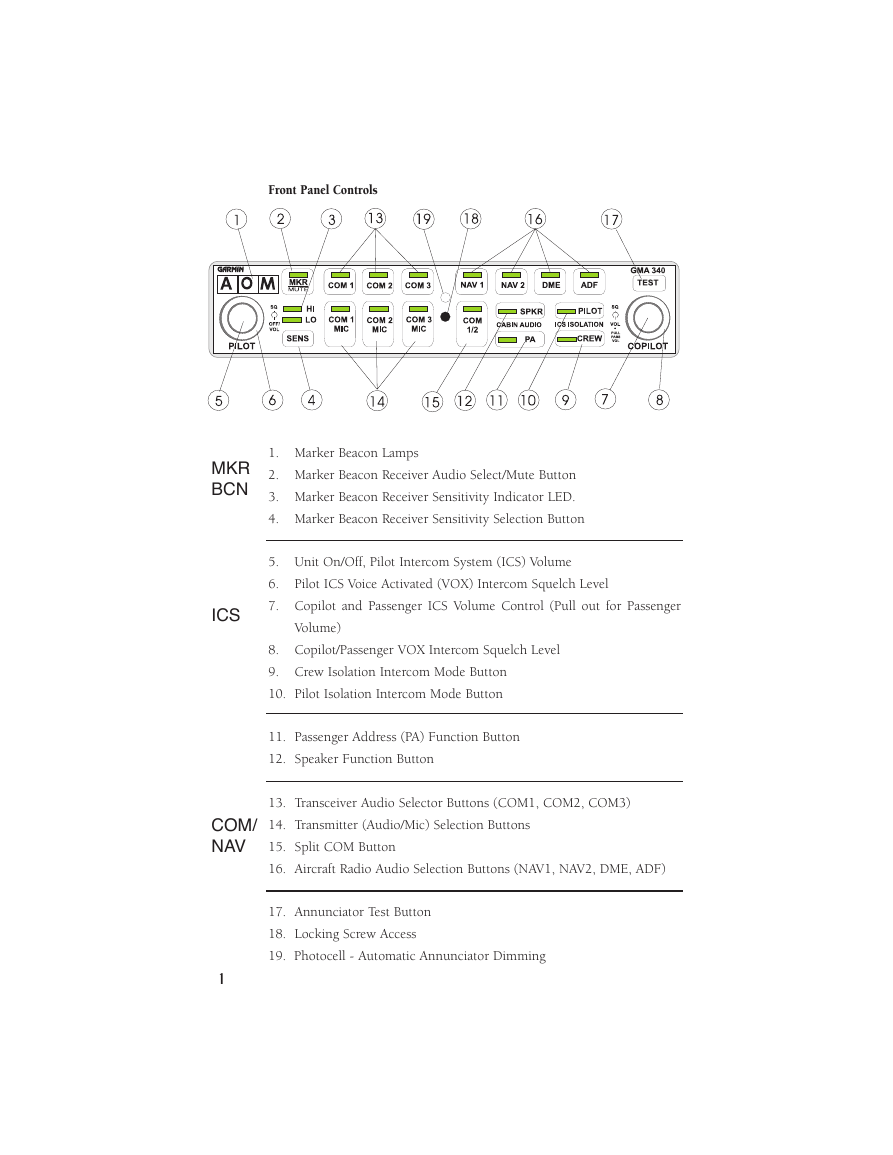
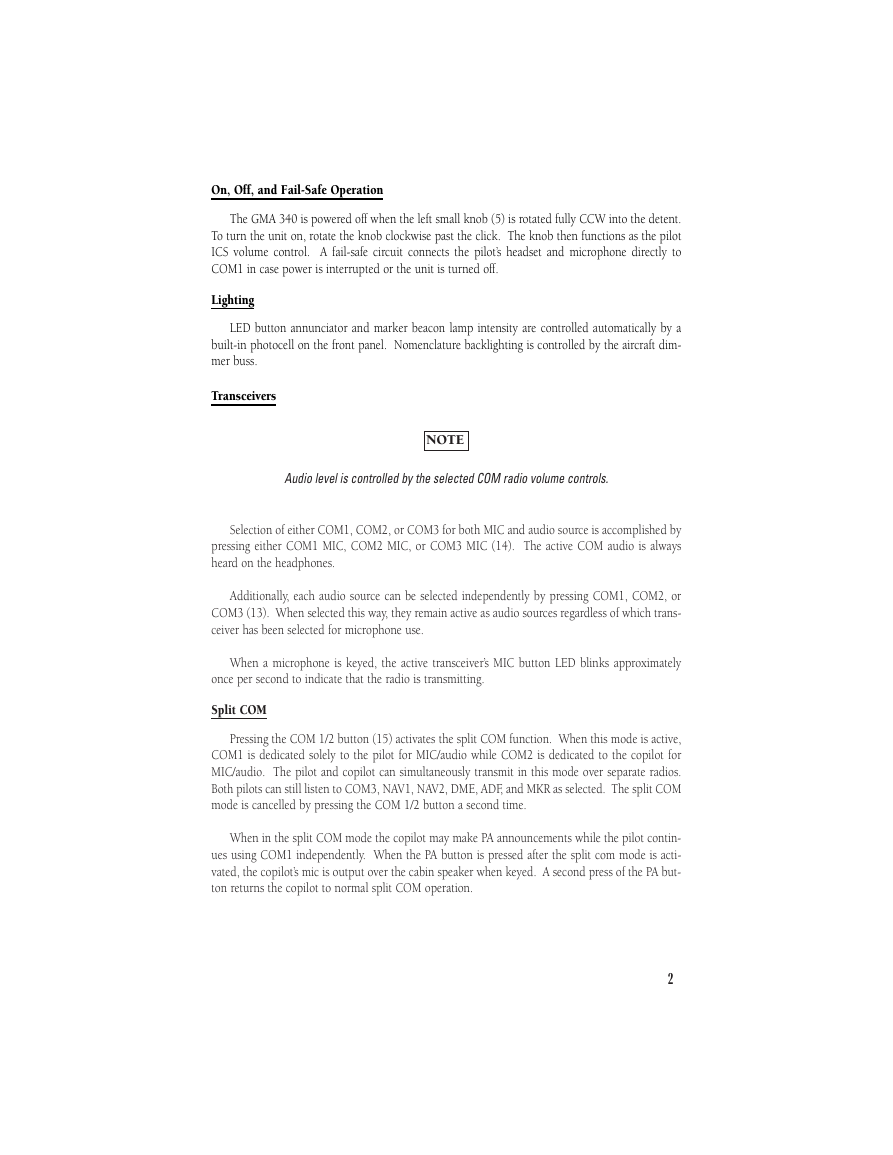
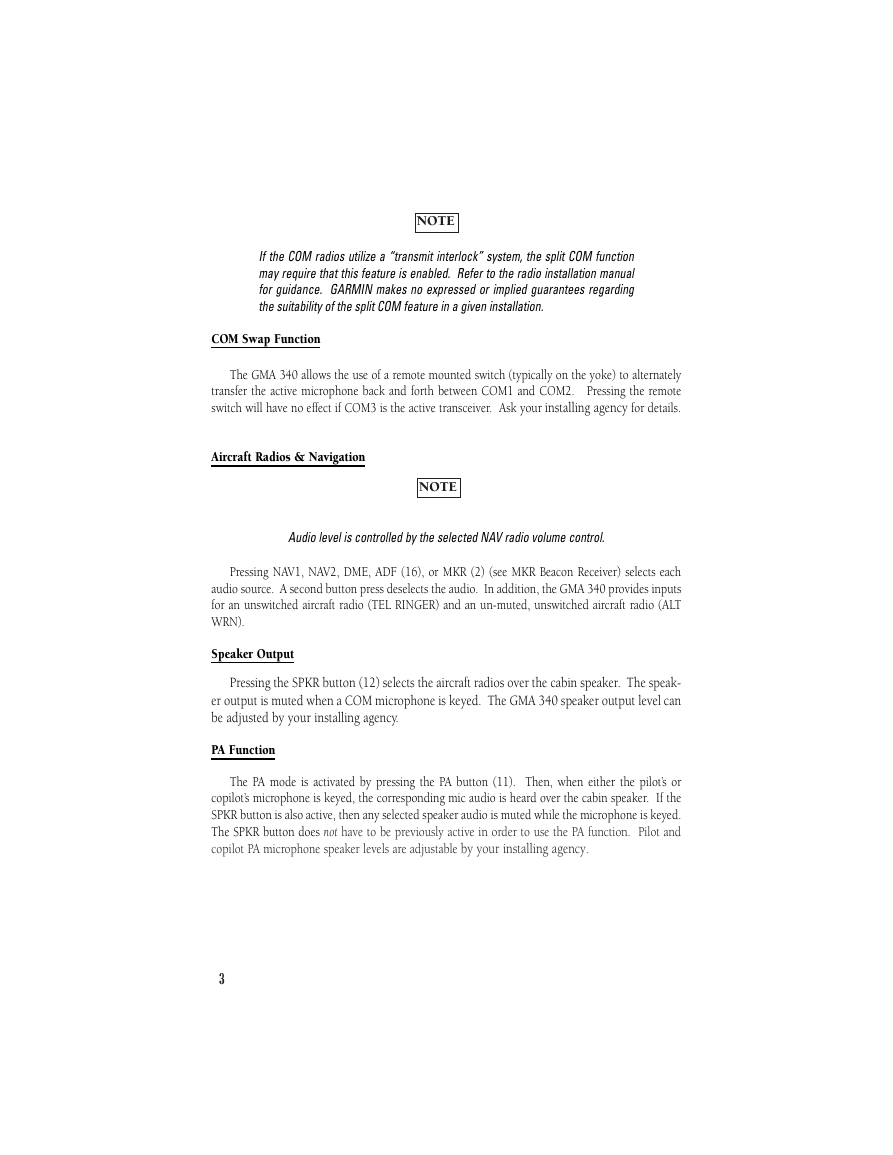
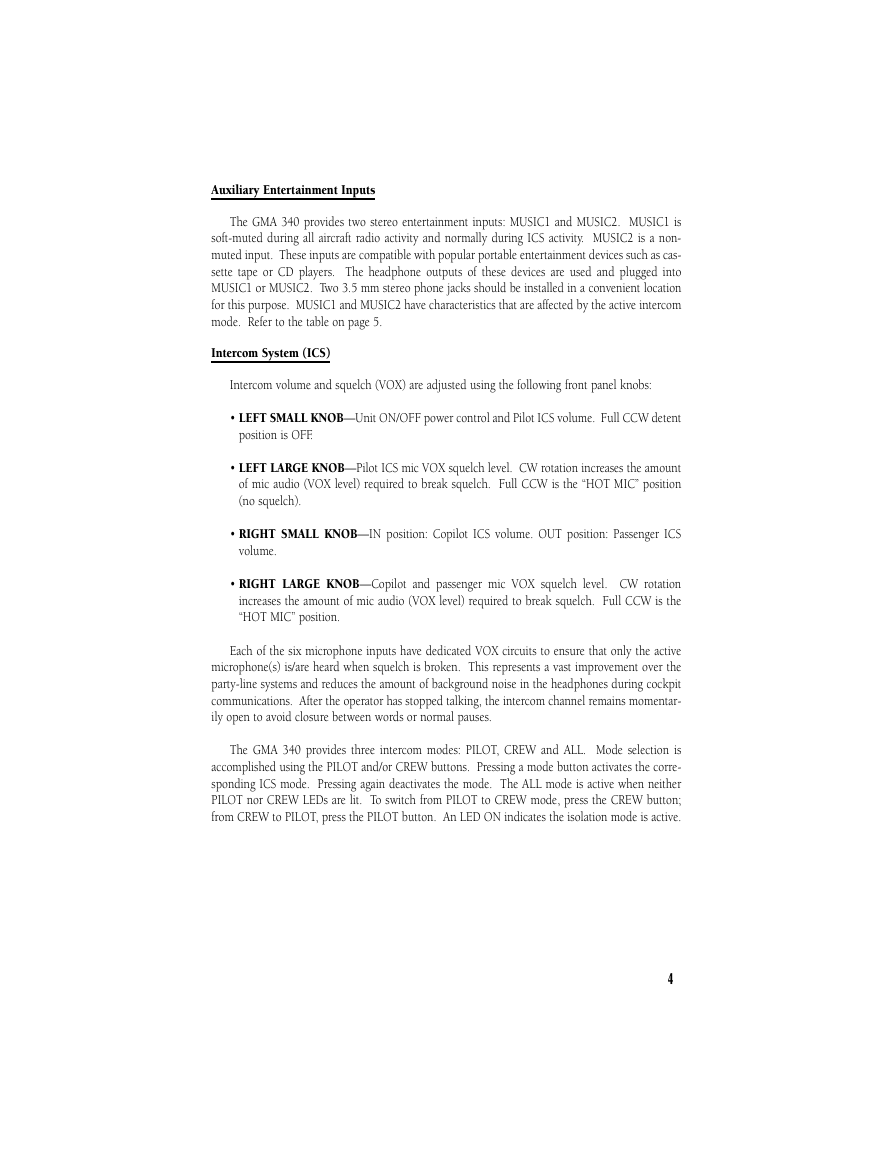
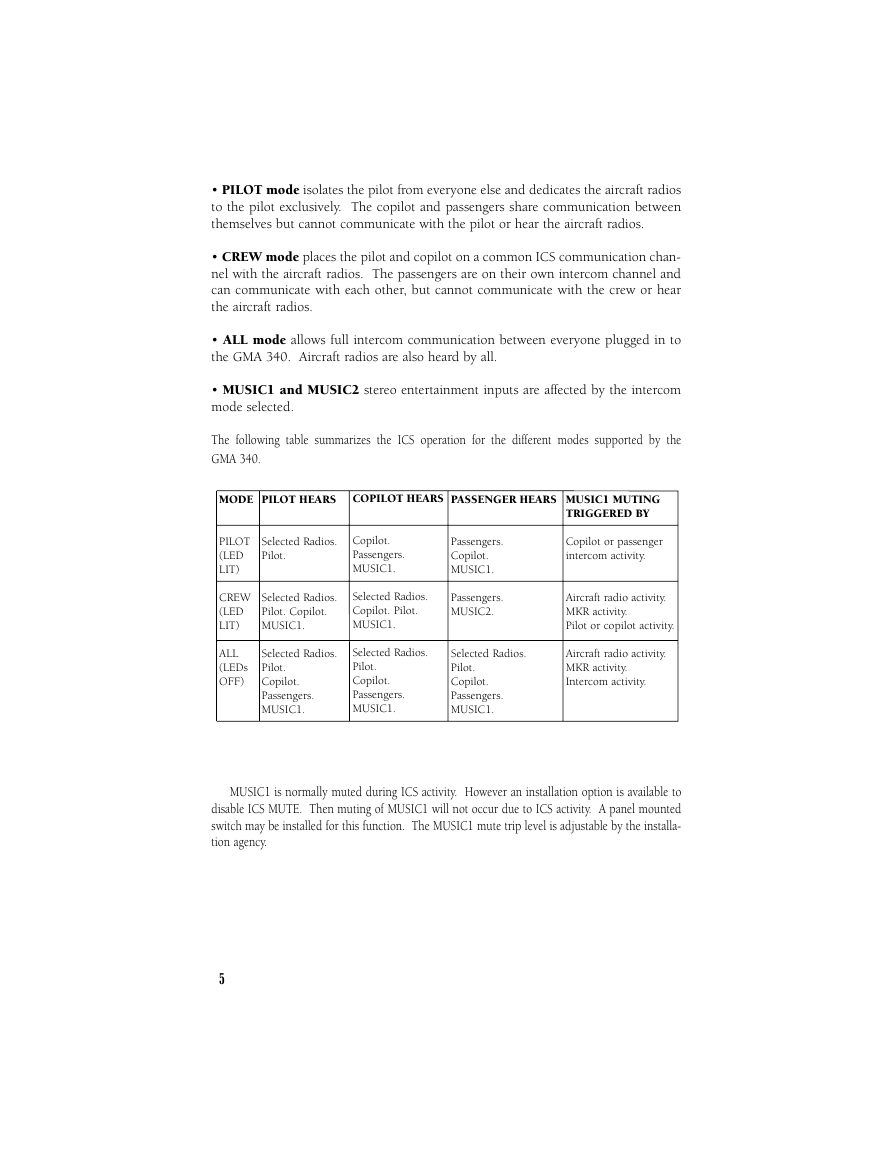
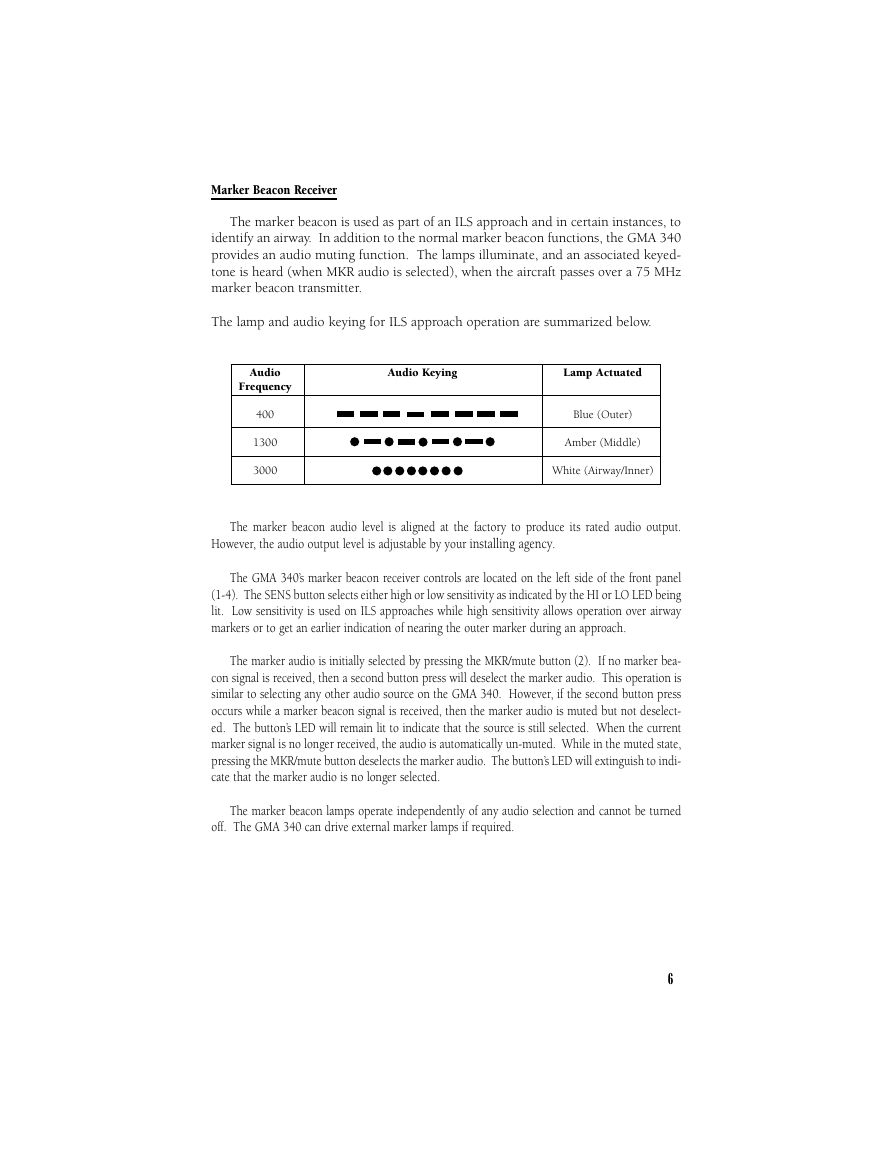
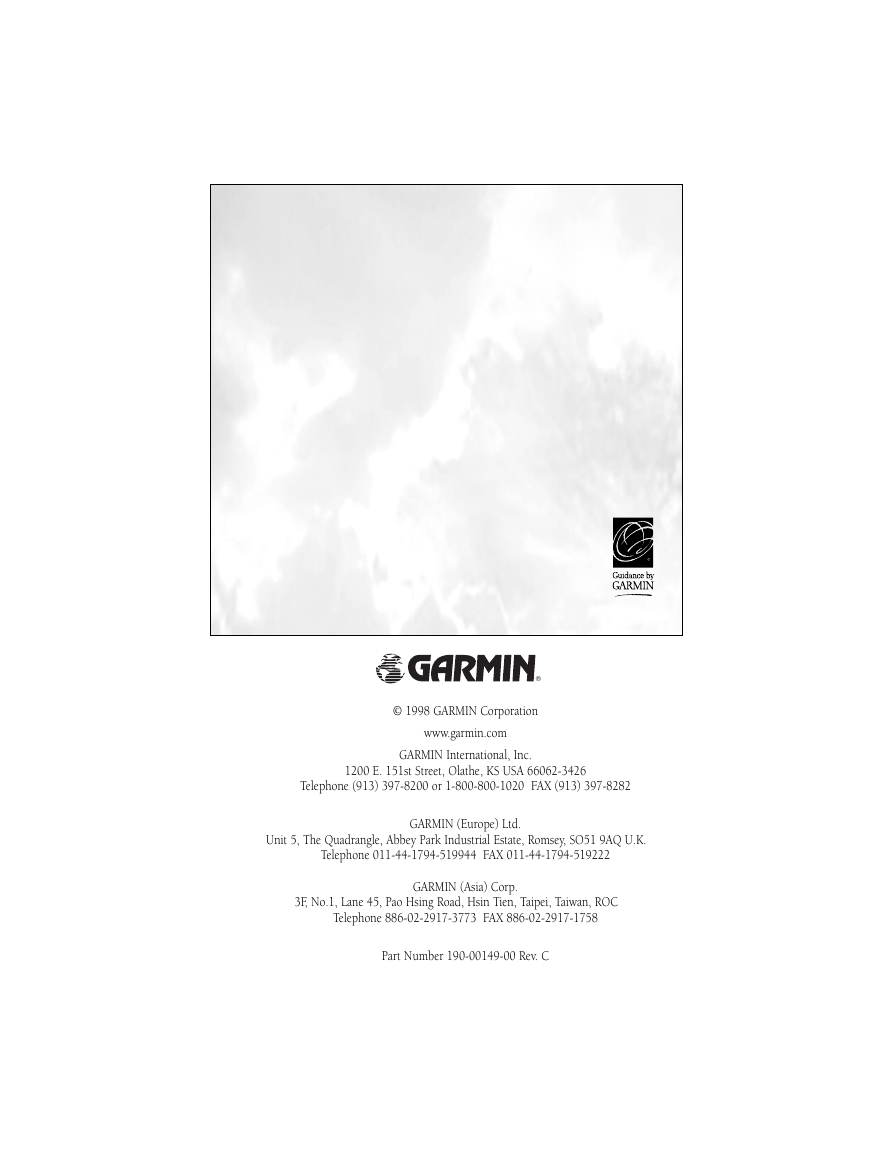








 2023年江西萍乡中考道德与法治真题及答案.doc
2023年江西萍乡中考道德与法治真题及答案.doc 2012年重庆南川中考生物真题及答案.doc
2012年重庆南川中考生物真题及答案.doc 2013年江西师范大学地理学综合及文艺理论基础考研真题.doc
2013年江西师范大学地理学综合及文艺理论基础考研真题.doc 2020年四川甘孜小升初语文真题及答案I卷.doc
2020年四川甘孜小升初语文真题及答案I卷.doc 2020年注册岩土工程师专业基础考试真题及答案.doc
2020年注册岩土工程师专业基础考试真题及答案.doc 2023-2024学年福建省厦门市九年级上学期数学月考试题及答案.doc
2023-2024学年福建省厦门市九年级上学期数学月考试题及答案.doc 2021-2022学年辽宁省沈阳市大东区九年级上学期语文期末试题及答案.doc
2021-2022学年辽宁省沈阳市大东区九年级上学期语文期末试题及答案.doc 2022-2023学年北京东城区初三第一学期物理期末试卷及答案.doc
2022-2023学年北京东城区初三第一学期物理期末试卷及答案.doc 2018上半年江西教师资格初中地理学科知识与教学能力真题及答案.doc
2018上半年江西教师资格初中地理学科知识与教学能力真题及答案.doc 2012年河北国家公务员申论考试真题及答案-省级.doc
2012年河北国家公务员申论考试真题及答案-省级.doc 2020-2021学年江苏省扬州市江都区邵樊片九年级上学期数学第一次质量检测试题及答案.doc
2020-2021学年江苏省扬州市江都区邵樊片九年级上学期数学第一次质量检测试题及答案.doc 2022下半年黑龙江教师资格证中学综合素质真题及答案.doc
2022下半年黑龙江教师资格证中学综合素质真题及答案.doc